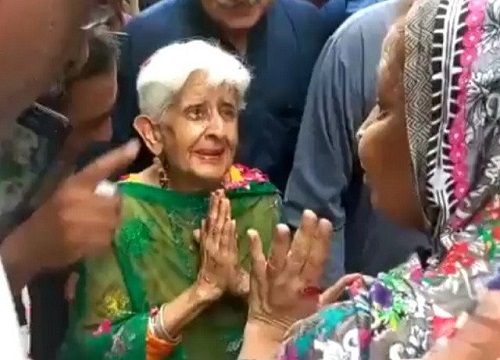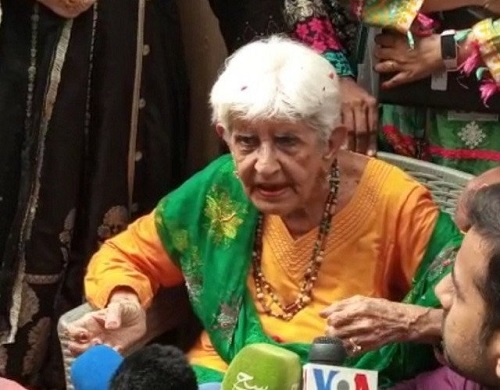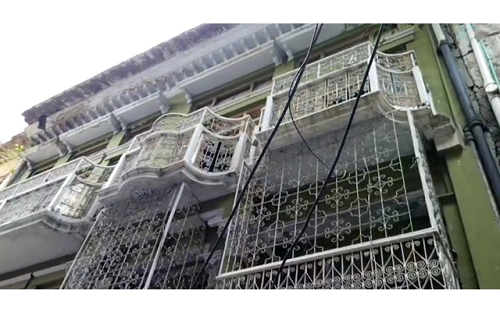Reena Varma stands at a neighbor’s house next to her ancestral home in Rawalpindi on Wednesday. — Reuters
Indian Woman Wants Visa Regimes Eased to Facilitate People on Both Sides of Border
By Kalbe Ali
Islamabad: The visit of the Indian nonagenarian to her ancestral three-storey home tucked away in the narrow alleys of the garrison city has opened a new chapter for the authorities to facilitate citizens of India and Pakistan on humanitarian grounds.
On Wednesday, Reena Varma, 90, from Pune, Maharashtra, finally fulfilled her family’s dream to visit the house that she left 75 years ago.
Her visit and related formalities were facilitated by the administrator of the Facebook page, ‘India Pakistan Heritage Club’ Imran William.
Mr William said the Indian authorities should reciprocate as more than 20 senior citizens from Pakistan wanted to visit their ancestral homes across the border.
“We work to highlight the shared heritage of both countries and reunite families separated by partition,” Mr William said, adding that “we want to help people in getting permission to travel across the border.”
Talking to Dawn after her visit to the house which was built by her father – an employee of the Military Accounts in the British India Army – the teary-eyed Ms Varma said: “We had a radio and a gramophone in those days and I used to sing from the balcony of our house, especially when it rained.”
She urged both countries to ease their visa regimes to enable people from either side to meet frequently.
“I would urge the new generation to work together and make things easy,” she said, adding that humanity was above everything, and all religions taught humanity.
She said the only thing which made her sad was that no one from her family of eight was alive to share her joy.
“I am very happy to see that the house stood intact; even the fireplace is still in functioning condition,” she said, adding that “during holidays in winter we used to burn wood for heating”.
Incidentally, for her age, Ms Varma not only recalled all details of the house but her life in Rawalpindi when she was merely 15 years old.
“We plan to visit Murree in the coming days – I remember we used to go there every summer,” she said.
Since her brother was in the British Army, the family moved to Pune after 1947 where he was posted, but the family did not take any property in claim against the Rawalpindi house.
“My mother always wanted to have this house, and she maintained that if we take any other house, our right to this house would be lost,” she said, adding that “things have changed but the love and affection showered by the people of Pakistan will remain in my heart forever”. - Dawn
Reuters adds: Ms Varma has vivid memories of the day she and her family left their house.
Her family was among the millions whose lives were thrown into turmoil by the partition of colonial India into two states, mainly Hindu India and mostly Muslim Pakistan, when British rule ended in 1947.
At one point, Ms Varma burst into laughter over being unable to climb a staircase without a support, saying she had once tackled it “like a bird” countless times a day.
When she lived in Rawalpindi hers was a Hindu street, she said, but Muslims, Christians and Sikhs all lived in her neighborhood peacefully.

According to a report in The Express Tribune by Imran Asghar, Reena Verma Chibbar was overjoyed when she reached her ancestral home in Prem Niwas Mahalla, situated on DAV College Road, Rawalpindi after 75 years.
Chibbar's decades-old neighbors welcomed her by showering rose petals. The Indian woman danced to the beats of the drum.
- Verma, who went to India with her family before the Partition when she was only 15 years old, reached her ancestral home on Wednesday and went to every room on the second floor of her ancestral home and refreshed her memories. She sang while standing on the balcony and cried remembering her childhood.
On reaching Prem Nawas Mahalla near DAV College, the area residents gave her a rousing welcome. Drums were played and flower petals were showered on the guest. Chibbar could not control herself and kept dancing as she heard the thud of the drums. The people of the neighborhood warmly welcomed the guest on her return to her birthplace.

Chibbar said that she did not feel she was from another country. “People living on both sides of the border love each other very much and we should remain as one,” she said.
When she entered the house, she took a look at all the rooms. She said that she was 15 years old when she migrated to India with her parents and other family members. She kept looking at the door and walls of the house including her bedroom, yard and sitting room for a long time. She talked about her life back in those days.
The senior Indian citizen said that she used to stand on the balcony and hum when she was young. She sang the same 75-year-old tune to reminisce her childhood and cried. She said that the memories of the house were palpable to her. “I can still see myself here today,” she said, adding that the neighbors living there at that time were very nice. “When someone got married, all the children of the street, including me, used to run and there was happiness everywhere. Now, once again, the heart wishes to remove the hatred between Pakistan and India and start living together again.

“Everyone was sad at that time when we left. Neighbors were considered members of the household and we would visit everyone's house,” she said, adding that those were very good days, not knowing where those people would go.
Chibbar said that all the people of her age have died. The grandchildren of their old neighbors now live in the house where she and her family lived. But the wall has not been changed even today. Reena Verma Chibbar also pointed at a closet in the house. She said that she used to keep books there. “I moved to India at the time of Partition,” she said, adding that she never forgot her home or the street. “Friends and food here are still fresh in my mind. Even today, the smell of these streets brings back old memories. I did not even imagine that I would ever come back here in life. Our culture is one. We are the same people. We all want to meet each other. A local person found me and sponsored a visa after which I reached Rawalpindi through the Wagah border,” she said.
She said that no Muslim or Sikh lived in the neighbourhood before the Partition. “All Hindus used to live here. I love Pakistan dearly and want to visit Pakistan again and again,” she said.

